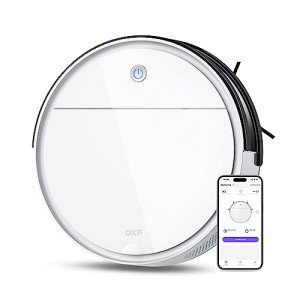Sage Advice About Autonomous Vacuum From A Five-Year-Old
The Rise of Autonomous Vacuums: Revolutionizing Home Cleaning
In the age of innovation, family tasks are ending up being progressively automated, and one of the most noteworthy improvements in this realm is the autonomous vacuum. These intelligent cleaning robotics are designed to ease the drudgery of traditional vacuuming, making them popular among time-strapped families. This article explores the development, functionality, advantages, and limitations of autonomous vacuums, in addition to a comparison of a few of the leading designs on the marketplace today.
What is an Autonomous Vacuum?
An autonomous vacuum, also understood as a robotic vacuum cleaner , is a little, automatic device that navigates through your home to clean floorings without human intervention. Equipped with sensors, cameras, and advanced software, these vacuums can identify obstacles, prevent stairs, and optimize cleaning courses. They typically run from a rechargeable battery, returning to their charging stations when their power is low or when cleaning tasks are finished.
Key Features of Autonomous Vacuums
Smart Navigation:
- Utilizes sensors and algorithms to map the environment.
- Can navigate complicated layouts and prevent obstacles.
Scheduling:
- Allows users to set cleaning times.
- Can operate when the house is empty, guaranteeing very little disturbance.
Connectivity:
- Many designs connect to Wi-Fi, permitting app control and combination with smart home systems.
- Users can tailor settings, check cleaning status, and get notifications through mobile applications.
Suction Power:
- Varies in between models; some deal adjustable suction settings for different floor types.
- High-end designs feature powerful suction efficient in choosing up family pet hair and deep dirt.
Floor Type Adaptability:
- Capable of cleaning carpets, wood, tiles, and more.
- Specific designs specialize in tailored cleaning for multiple surface areas.
The Advantages of Using Autonomous Vacuums
1. Time-Saving
Among the most considerable benefits of autonomous vacuums is the amount of time they save. Rather than investing hours pushing a standard vacuum, property owners can set robotic vacuums to tidy while they are participated in other activities.
2. Consistent Cleaning Schedule
With the capability to arrange cleansings, these vacuums make sure that spaces are regularly cleaned up, leading to a cleaner home overall. Regular cleaning helps maintain indoor air quality, particularly for households with allergic reactions or asthma.
3. Smart Home Integration
Numerous autonomous vacuums can be incorporated with smart home systems for seamless operation. best robot vacuum cleaner UK can manage their vacuums via voice commands through devices like Amazon Alexa or Google Assistant, boosting user benefit.
4. Compact Design
The slim profile of these devices permits them to clean under furniture, such as sofas and beds, where traditional vacuums often can not reach.
5. Pet-Friendly
For family pet owners, autonomous vacuums can be a game-changer, as they are often equipped with specialized features for getting animal hair and dander, contributing to a cleaner home environment.
Limitations of Autonomous Vacuums
Despite their many benefits, autonomous vacuums likewise have limitations:
1. Minimal Deep Cleaning
While these vacuums efficiently preserve cleanliness, they may not replace the effectiveness of a deep tidy provided by standard vacuums, especially for greatly stained areas.
2. Capability Constraints
Many autonomous vacuums featured little dust bins that need to be cleared regularly, specifically in larger homes or homes with pets. This can be a trouble for some users.
3. Navigation Challenges
Although navigation technology is continually enhancing, some models might fight with particular designs, especially complicated spaces with many barriers or extremely small rooms.
4. Price Point
While prices have ended up being more accessible, high-end designs can still be rather costly, positioning a barrier for some consumers.
Comparison of Top Autonomous Vacuum Models
Model
Smart Features
Battery Life
Suction Strength
Price Range
iRobot Roomba 980
App Control, Voice Assistant
120 minutes
1700 Pa
₤ 700 – ₤ 900
Roborock S6 MaxV
Advanced Mapping, Connectable
180 minutes
2500 Pa
₤ 600 – ₤ 800
Ecovacs Deebot Ozmo
Mopping, Smart Home
110 minutes
1500 Pa
₤ 450 – ₤ 700
Neato Botvac D7
Laser Navigation, Custom Zones
120 minutes
2000 Pa
₤ 800 – ₤ 900
Shark IQ Robot
Self-Emptying Base, Smart Map
90 minutes
1500 Pa
₤ 400 – ₤ 600
Notable Takeaways
- Smart Features: Consumers should focus on models offering robust clever functions for convenience and efficiency.
- Battery Life: A longer battery life is advantageous for bigger living areas.
- Suction Strength: Depending on family needs, varying suction power can significantly affect cleaning efficiency.
FAQs about Autonomous Vacuums
Q1: How do I keep my autonomous vacuum?
A: Regular maintenance consists of cleaning the brushes, emptying the dustbin, and looking for blockages. Furthermore, keeping the sensors clean up will assist maintain navigation precision.
Q2: Can robotic vacuums tidy carpets and carpets?
A: Yes, numerous robotic vacuums are created to successfully clean both hard surfaces and carpets. Nevertheless, suction power might vary based on the model.
Q3: Do robotic vacuums need Wi-Fi?
A: While numerous autonomous vacuums benefit from Wi-Fi connection for app control and updates, some models can operate independently without a cordless connection.
Q4: How frequently should I run my robotic vacuum?
A: It depends upon your living circumstance, however running it a number of times a week is typically suggested, especially for homes with animals.
In conclusion, autonomous vacuums represent a considerable advancement in home cleaning innovation, appealing convenience and efficiency. While these gizmos might not entirely change conventional vacuum cleaners, they are certainly valuable in keeping a tidy living environment. As innovation continues to develop, the future of home cleaning looks appealing, and these devices are at the leading edge of the transformation.
